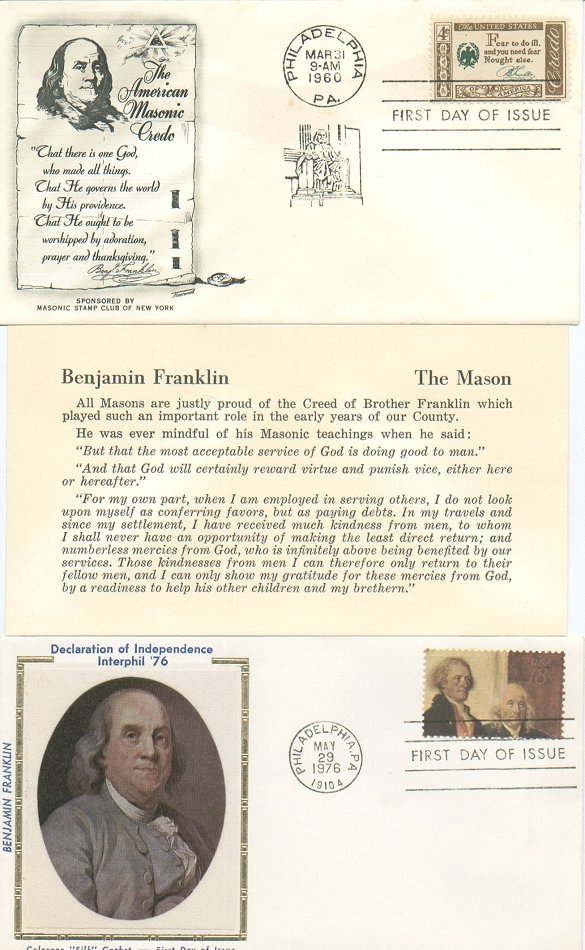Benjamin Franklin
(1706-1790)
American Statesman and Freemason
FDC

Benjamin Franklin
(1706-1790) American Statesman, scientist, philosopher and author.
Born January 17, 1706 in Boston, Mass. Apprenticed to his brother,
James, a printer, when only 12, he left him five years later after
disagreements, and settled in Philadelphia. First employed as a printer,
he became proprietor of a printing business and published The Pennsylvania
Gazette, 1730-48 and gained wide recognition with his Poor Richard's
Almanack, 1732-57. In 1727 he organized the "Junto" club which
became the American Philosophical Society, and in 1731 laid the foundations
for a library which developed into the Philadelphia Public Library.
He was instrumental in improving the lighting of city streets, invented a
heating stove about 1744 (which is still being made), and, became interested
in electricity, tried his famous kite experiments in 1752. In 1748 he
sold his business to the foreman and retired to devote himself to public life.
In 1754 he was Pennsylvania's delegate to the Albany Congress and from 1757-62
was in England representing Pa. in efforts to enforce taxes on proprietary
estates. In 1766 he was called before the English House of Commons to
explain colonial opposition to the Stamp Tax. He returned to
Philadelphia when the war became inevitable in 1775. He was a member of
the second Continental Congress of 1775 and was on the committee to draft the
Declaration of Independence, being one of its signers. In 1776 he was
sent as one of a committee of three to negotiate a treaty with France.
He became immensely popular during his stay which lasted until 1785, during
which time he was U.S. minister. In 1781 he was named with Jay and Adams
to negotiate peace with Great Britain and returned to Philadelphia in
September 1785. From 1785-87 he was president of the Pa. executive
council. In 1727 he organized the "Leathern Apron Club" as a secret
society in Philadelphia (non-Masonic); and on December 8, 1730 printed an
article in his paper pretending to reveal Masonic mysteries. Two months
later (Feb., 1731) he received his degrees in St. John's Lodge of Philadelphia
and became active in its work from the very beginning. He was secretary
of the Lodge from 1735-38; elected junior grand warden of the Grand Lodge of
Pennsylvania on June 24, 1732 and the grand master on June 24, 1734. He
was appointed provincial grand master (first native born) by Thomas Oxnard, of
Boston on June 10, 1749. He was deposed as provincial grand master by
William Allen on March 13, 1750, but immediately appointed deputy grand
master. On March 12, 1752 he was named to a committee for building "the
Free-Mason's Lodge" in Philadelphia and on June 24, 1755 took a prominent part
in the dedication of the same as the first Masonic building in America.
In 1760 he was named provincial grand master of Philadelphia. In 1734 he
printed Anderson's Constitutions as Mason Book, which was the first
Masonic book printed in America. In 1759 he was a visitor to Lodge Saint
David at Edinburgh, Scotland and on November 17, 1760 was present at the Grand
Lodge of England, held at Crown & Anchor, London as "provincial grand master."
On April 7, 1778 he assisted in the initiation of Voltaire, in the Lodge of
Nine Sisters in Paris, and affiliated with that Lodge the same year. On
November 28, 1778 he officiated at the Masonic funeral services held by that
Lodge for Voltaire. On May 21, 1779 we find him elected master of the
Lodge of Nine Sisters. He served as master for two years. On July
7, 1782 he was a member of the Respectable Lodge de Saint Jean de Jerusalem
and on April 24, 1785 was elected honorary master of the same. He was
also elected honorary member of the Loge des Bon Amis of Rouen, France in
1785. He died April 17, 1790.

